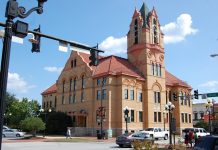By Stan Welch
South Carolina Attorney General Alan Wilson told a business group Monday that he spends most of his time and effort in defending the U.S. Constitution and states’ rights against intrusion by the federal government. Speaking to The First Monday Club, a conservative, non-partisan group of business and civic leaders, Wilson said he had been in the chambers of the United States Supreme Court five times in the last two months, hearing arguments on various national issues before the Court.
Foremost among those was the national health care plan proposed by President Obama, and which bears his name, Obamacare. Wilson stressed his position, and that of a number of other states’ attorneys general, that Obamacare actually creates commerce in order to give the federal government the power to regulate it.
“The plan requires everyone to buy health insurance, thereby creating a situation where you can be fined for doing nothing. If the federal government can regulate doing nothing, it can regulate doing everything,” said Wilson, to the crowd of approximately 60 people. “If this law is upheld, we as Americans cease to be citizens and become commodities, to be regulated.”
Wilson declined to predict the outcome of the case but seemed to lean towards a 5-4 defeat of the law, with Justice Kennedy, a well-known swing vote, making the difference in the outcome.
Another issue, the states’ involvement in enforcing immigration laws, is also before the Court. The Arizona law, which allows law enforcement to ask several questions of motorists who they have reason to believe may not be here legally in order to determine if they are indeed illegal immigrants.
South Carolina’s law is so similar that an affirmation of the Arizona law by the Court would essentially uphold our law as well, said Wilson. “The hypocrisy of this situation is that Arizona police officers are to be prohibited from profiling by asking questions to determine if someone is here illegally. But a handbook for State Department employees tells them how to profile people in order to determine if they should be instructed how to seek protection under our immigrations laws. So we can profile to get them in, but not to keep them out.”
The third issue Wilson addressed is the challenge by the U.S. Department of Justice to South Carolina’s voter ID law. “These laws already exist in other states, but because we are still subject to federal review because our state is considered to have a history of discrimination by the federal government, any law we propose concerning voting or elections has to be approved by the feds, based on a 1965 formula put in place as part of the voter’s rights act. If the Anderson Elections Commission wanted to change their office hours from 8-5 to 9-5, the USDOJ would have to approve it.”
Wilson pointed out that voter fraud is more than just a possibility. “In south Carolina we have 37,000 dead voters still on the rolls, and 92,000 who have moved out of the state since the last elections. Those numbers allow for a real possibility of fraud. And unless we have voter ID, how would we ever know?”
















